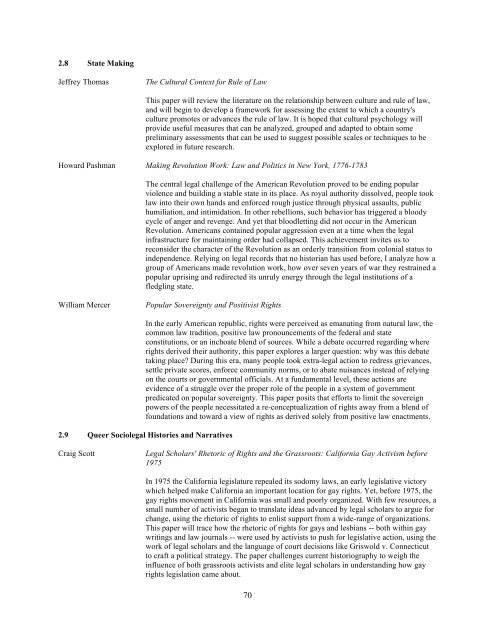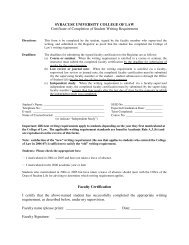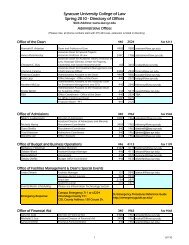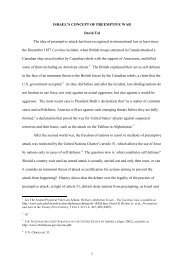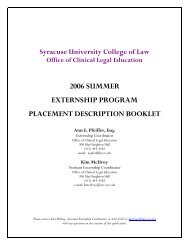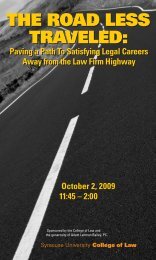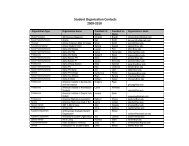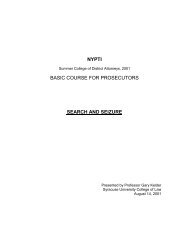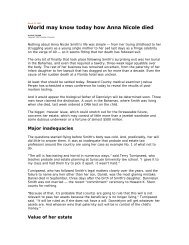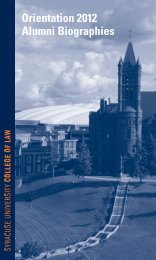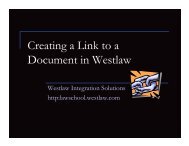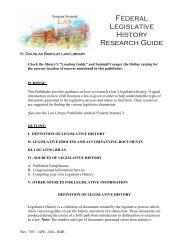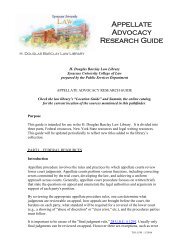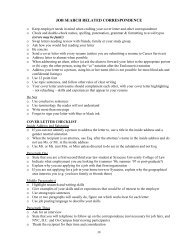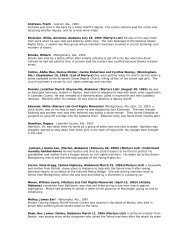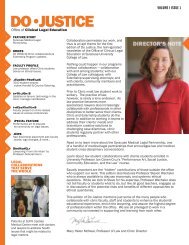2011 Conference Program (PDF) - Syracuse University College of Law
2011 Conference Program (PDF) - Syracuse University College of Law
2011 Conference Program (PDF) - Syracuse University College of Law
Create successful ePaper yourself
Turn your PDF publications into a flip-book with our unique Google optimized e-Paper software.
2.8 State Making<br />
Jeffrey Thomas<br />
The Cultural Context for Rule <strong>of</strong> <strong>Law</strong><br />
This paper will review the literature on the relationship between culture and rule <strong>of</strong> law,<br />
and will begin to develop a framework for assessing the extent to which a country's<br />
culture promotes or advances the rule <strong>of</strong> law. It is hoped that cultural psychology will<br />
provide useful measures that can be analyzed, grouped and adapted to obtain some<br />
preliminary assessments that can be used to suggest possible scales or techniques to be<br />
explored in future research.<br />
Howard Pashman Making Revolution Work: <strong>Law</strong> and Politics in New York, 1776-1783<br />
The central legal challenge <strong>of</strong> the American Revolution proved to be ending popular<br />
violence and building a stable state in its place. As royal authority dissolved, people took<br />
law into their own hands and enforced rough justice through physical assaults, public<br />
humiliation, and intimidation. In other rebellions, such behavior has triggered a bloody<br />
cycle <strong>of</strong> anger and revenge. And yet that bloodletting did not occur in the American<br />
Revolution. Americans contained popular aggression even at a time when the legal<br />
infrastructure for maintaining order had collapsed. This achievement invites us to<br />
reconsider the character <strong>of</strong> the Revolution as an orderly transition from colonial status to<br />
independence. Relying on legal records that no historian has used before, I analyze how a<br />
group <strong>of</strong> Americans made revolution work, how over seven years <strong>of</strong> war they restrained a<br />
popular uprising and redirected its unruly energy through the legal institutions <strong>of</strong> a<br />
fledgling state.<br />
William Mercer<br />
Popular Sovereignty and Positivist Rights<br />
In the early American republic, rights were perceived as emanating from natural law, the<br />
common law tradition, positive law pronouncements <strong>of</strong> the federal and state<br />
constitutions, or an inchoate blend <strong>of</strong> sources. While a debate occurred regarding where<br />
rights derived their authority, this paper explores a larger question: why was this debate<br />
taking place During this era, many people took extra-legal action to redress grievances,<br />
settle private scores, enforce community norms, or to abate nuisances instead <strong>of</strong> relying<br />
on the courts or governmental <strong>of</strong>ficials. At a fundamental level, these actions are<br />
evidence <strong>of</strong> a struggle over the proper role <strong>of</strong> the people in a system <strong>of</strong> government<br />
predicated on popular sovereignty. This paper posits that efforts to limit the sovereign<br />
powers <strong>of</strong> the people necessitated a re-conceptualization <strong>of</strong> rights away from a blend <strong>of</strong><br />
foundations and toward a view <strong>of</strong> rights as derived solely from positive law enactments.<br />
2.9 Queer Sociolegal Histories and Narratives<br />
Craig Scott<br />
Legal Scholars' Rhetoric <strong>of</strong> Rights and the Grassroots: California Gay Activism before<br />
1975<br />
In 1975 the California legislature repealed its sodomy laws, an early legislative victory<br />
which helped make California an important location for gay rights. Yet, before 1975, the<br />
gay rights movement in California was small and poorly organized. With few resources, a<br />
small number <strong>of</strong> activists began to translate ideas advanced by legal scholars to argue for<br />
change, using the rhetoric <strong>of</strong> rights to enlist support from a wide-range <strong>of</strong> organizations.<br />
This paper will trace how the rhetoric <strong>of</strong> rights for gays and lesbians -- both within gay<br />
writings and law journals -- were used by activists to push for legislative action, using the<br />
work <strong>of</strong> legal scholars and the language <strong>of</strong> court decisions like Griswold v. Connecticut<br />
to craft a political strategy. The paper challenges current historiography to weigh the<br />
influence <strong>of</strong> both grassroots activists and elite legal scholars in understanding how gay<br />
rights legislation came about.<br />
!<br />
70


